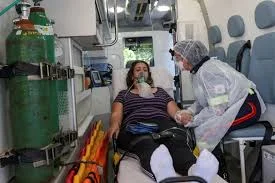 Brazil’s healthcare system is on the verge of collapse as the country battles a dramatic surge in COVID-19 cases, overwhelming hospitals and intensive care units nationwide. Health authorities report that many regions, including São Paulo and Rio de Janeiro, are facing critical shortages of hospital beds, medical supplies, and oxygen.
Brazil’s healthcare system is on the verge of collapse as the country battles a dramatic surge in COVID-19 cases, overwhelming hospitals and intensive care units nationwide. Health authorities report that many regions, including São Paulo and Rio de Janeiro, are facing critical shortages of hospital beds, medical supplies, and oxygen.
The Ministry of Health confirmed that the number of daily cases and deaths has reached record levels, with more than 3,000 deaths reported on several consecutive days. The country is now grappling with the rapid spread of the P.1 variant, which was first identified in Manaus, and is believed to be more transmissible. The strain has contributed to the worsening public health crisis.
Dr. Fiocruz, Brazil’s leading public health institute, issued a warning that the entire hospital system in the country is nearing capacity. More than 90% of ICU beds in most Brazilian states are currently occupied, and in some regions, hospitals have already run out of space to accommodate new patients. Ambulances are seen waiting in long lines outside hospitals, with many patients being treated in hallways.
Health Minister Marcelo Queiroga has called the situation “extremely serious” and urged for stricter measures to curb the virus spread. Despite this, efforts to enforce lockdowns and social distancing measures have been met with resistance in parts of the country, with President Jair Bolsonaro maintaining his opposition to stringent restrictions. Bolsonaro has instead promoted the use of unproven treatments and downplayed the severity of the pandemic, leading to widespread criticism from health experts.
The vaccination campaign in Brazil has been slow compared to other nations, with only a small percentage of the population vaccinated as of today. Efforts to accelerate vaccine distribution are ongoing, but supply shortages have further complicated the rollout.
The World Health Organization (WHO) expressed deep concern over the unfolding crisis in Brazil and the potential for the country’s situation to affect neighboring nations. WHO Director-General Dr. Tedros Adhanom Ghebreyesus urged the international community to provide support and solidarity to help Brazil manage the situation. “We are closely monitoring the situation in Brazil, and it is critical that all available resources are mobilized to support the health system in this time of crisis,” Dr. Tedros said.






















